Bittersweet EU Perspectives in South & Eastern Europe
EU enlargement to the Western Balkans has been a frustrating process — even though embracing the Balkans would be more trivial than to include new candidates such as Ukraine. However, tangible plus gradual progress in the area of EU accession in 2022 andthe coming years is key now, so that Ukraine has perspectives based on examples in the Balkans. That is the approach that Russia cannot present EU membership as a no-win deal. This is how we see the situation in our joint assessment out of Tirana, Sarajevo, Kievand Vienna.
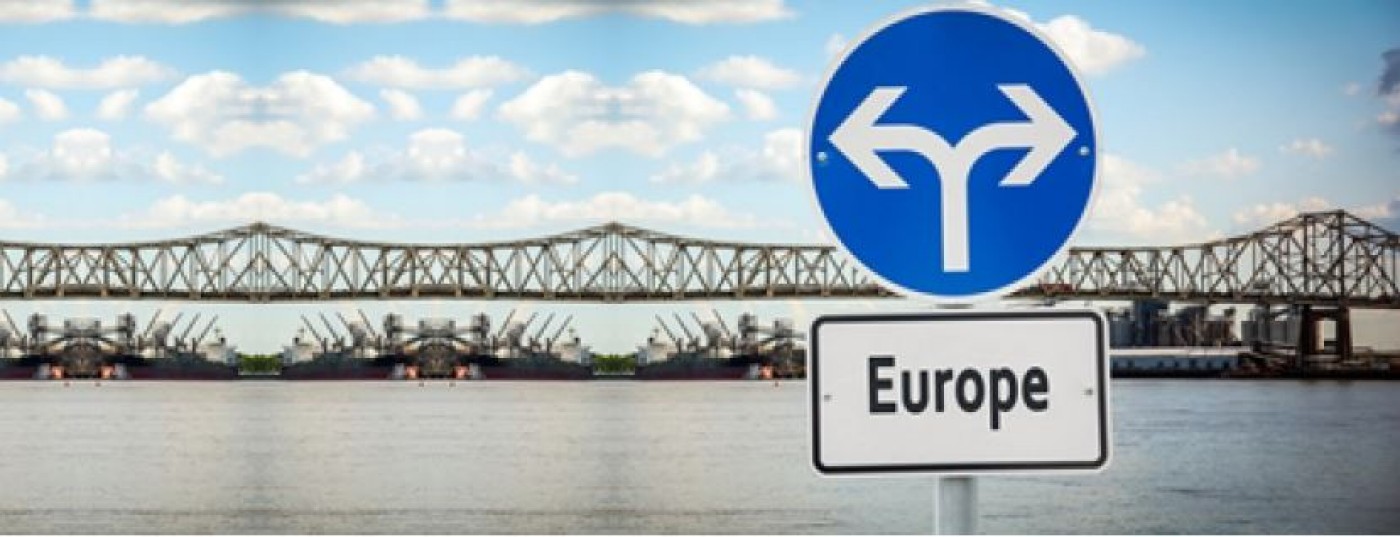
EU: Incapable of action at present vs. challenges for decade(s) to come
The EU (enlargement) summit end of June (incl. an EU-Western Balkans leaders' meeting) has an extremely bittersweet aftertaste for the CEE region. With the official accession candidate status for Ukraine and Moldova, EU has come to a more concrete enlargement perspective for these two countries. Such a move was possibly factually and morally unavoidable. At the same time, EU enlargement to the Western Balkans continues to falter, as it has for years and now. Compared to Ukraine and Moldova Bosnia has not been granted official candidate status yet, Albania and Northern Macedonia are still not allowed to finally start EU entry negotiations because of internal EU blockades and leadership weaknesses. EU accession negotiations of Montenegro and Serbia are stuck in nowhere since 2012/2013. In some cases, not only disappointment with EU enlargement, but alienation is recognizable in the Western Balkans. However, given the challenges in the new EU candidate Ukraine, some Western Balkan issues appear more manageable nowadays. Not to forget the demographic and economic dimension.
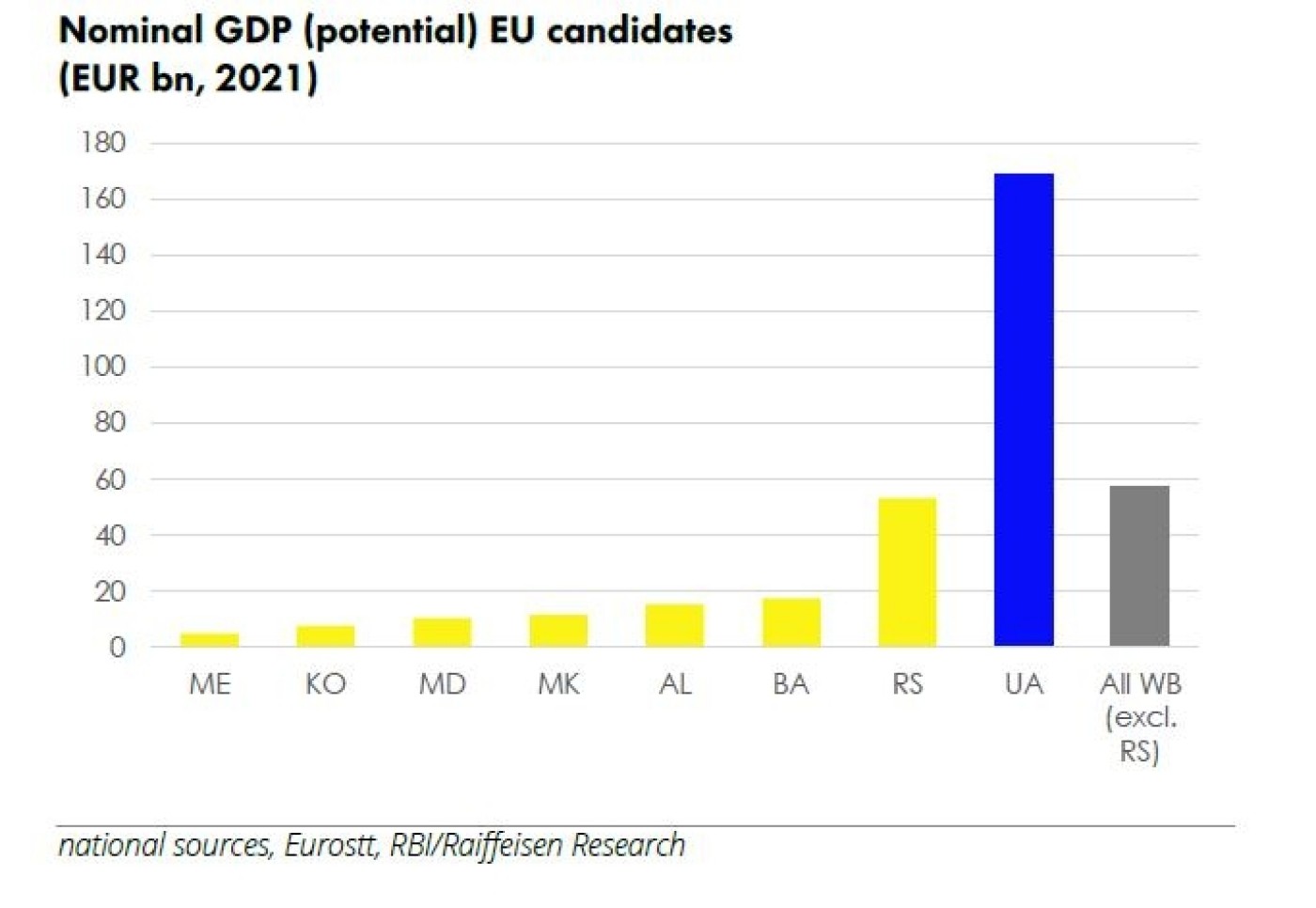
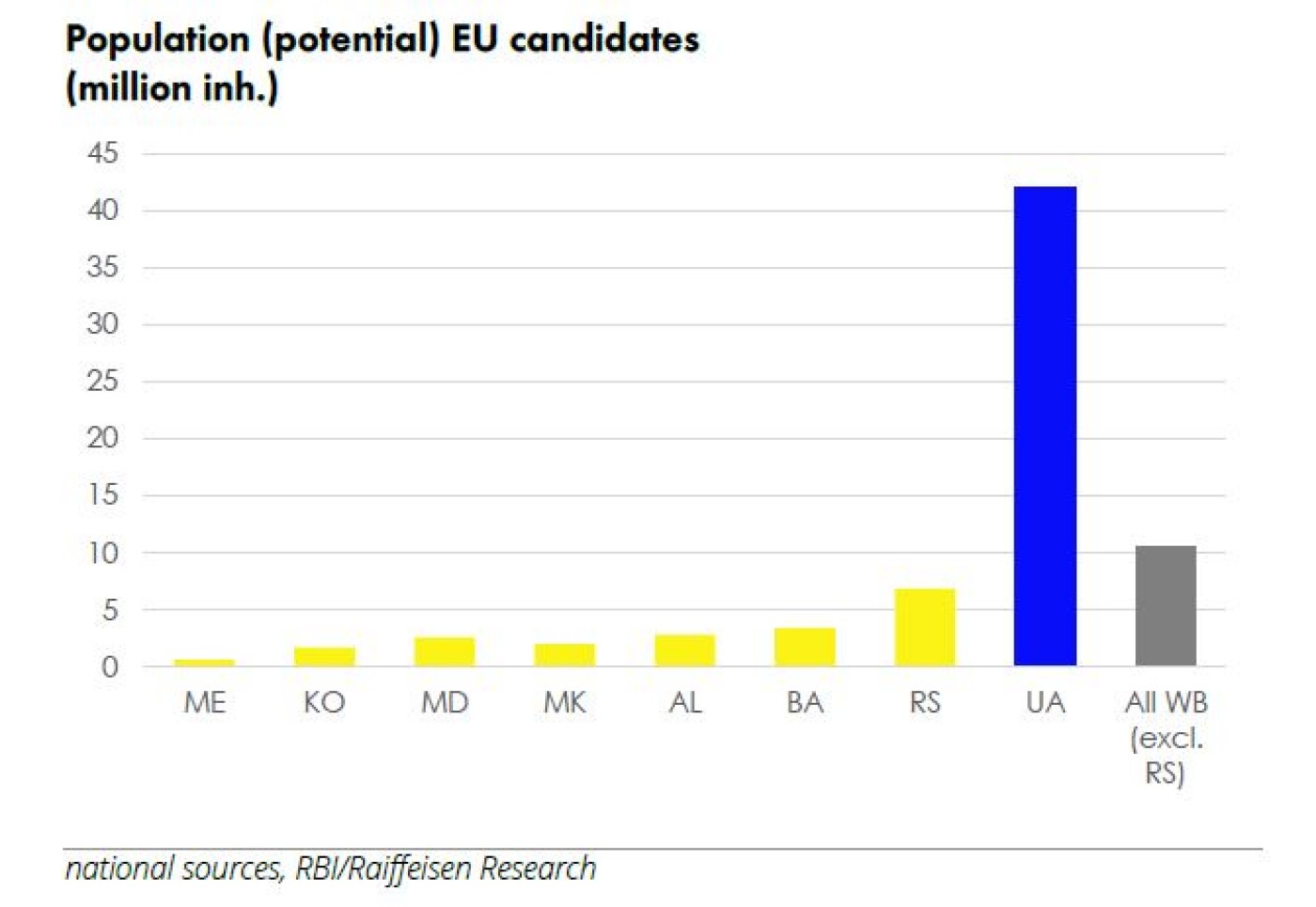
EU accession: Do not mix up Ukraine & Western Balkans - but there are some crossconnections
All Western Balkan countries (excl. Serbia) represent 30% of Ukraine GDP (as of 2021). Including Serbia the relation would be at 65%. In terms of population, these ratios are at 25% and 40% respectively (Western Balkans population without/with Serbia inrelation to the Ukrainians). That said EU is currently possibly much more integratedwith the Western Balkans than Ukraine. European Foreign Direct Investment (FDI) in the Western Balkans (estimated at EUR 40 bn) are possibly higher than "true" EUFDI in Ukraine (correcting for Offshoring). Western banking exposure to Ukraine just represents some 30% of Western Balkan exposures (mainly EU banks). Therefore, starting positions of new EU candidates (Ukraine, Moldova) and the Western Balkans are totally different. Not to speak about border issues and the institutional domain. However, even if both enlargement tangents (post-Soviet space/Western Balkans) may not have anything to do with each other directly, there are important and complex cross-connections. It is important to pay active attention to them. With new EU enlargement candidates, EU's enlargement agenda will remain an essential and (geo-)strategic policy field for decades to come. Before the emergence of new EU candidates out of the post-Sovietspace, there was a chance that the EU accession agenda — after potential entry of the Western Balkans — might have been put aside or even closed down. Possibly, the very slow EU accession process of Turkey (a candidate at least as challenging as Ukraine) could have come to an end in this way. Now a return to serious negotiations cannot be ruled out in the coming decades with EU accession into the post-Soviet space likely being a longlasting process.
EU & Western Balkans: Behind the scenes, there is some hope for progress
However, despite the fact that the June EU summit did not produce concrete results for the Western Balkans, there is optimism that underneath things are moving. We might see some concrete progress later in 2022. The Bulgarian parliament's vote on lifting the veto on North Macedonia under certain conditions goes in the right direction, although it remains unclear how palatable this will be to the fragile North Macedonian government. The push from the French government — a staunch reluctant player to EU enlargement up until recently — to reach a compromise between Bulgaria and North Macedonia is very telling about the new geopolitical reality in Europe after Russia’s aggression to Ukraine. Even for other countries in the region such as Bosnia and Herzegovina or Kosovo the plate is not completely empty. The agreement brokered between EU and all key Bosnian political parties in June seems to have laid the road to a positive outcome for candidate status to be granted to Bosnia by the end of 2022 — if milestones are reached (especially in the areas of rule of Law and Judiciary reforms outlined in the agreement). It is indicative that in such challenging times, Republic of Srpska turned back from full confrontation with Western countries and signed an agreement with EU politicians, along with other political parties. Thus, it seems that there is a look West rather than East. See also our Watch Notes as of June (Political agreement on principles for a functional B&H; Political stalemate saga put to an end). Although the youngestcountry in Europe, Kosovo demonstrated that the democratic environment is lively with competitive and accepted elections, a rarity in this corner of Europe. Progress made on the democratic front and the improvement in democratic indices has not been rewardedyet by EU. In our opinion, EU wants to exert pressure on the government in Kosovo to extract some concessions on a final agreement with Serbia. That said, the EU could already offer Kosovo visa liberalization as a gesture to bring the country closer, as it remains the only Western Balkan country to have such restrictions. Candidate status may follow later.
EU: (Consistent) geopolitical stance in case of Ukraine and towards Russia?
Potential enlargement of EU into the Post-Soviet space, i.e. to include Ukraine and Moldova as "former" Eastern Partnership (EaP) countries, has a substantive geopolitical dimension. The EU would expand far into geographic/geopolitical areas, which Moscow sees as its turf. In doing so, the EU would send an important signal from a long-term perspective and to (EaP) countries more in Russia's indirect and direct sphere of influence (Georgia, Armenia, perhaps also Belarus at some point?). However, the EU is now entering into a geopolitical game with Russia and this must be taken into account. For example, EU can hardly accept Ukraine or Moldova as members with long-term unresolved border issues (on a substantial scale). In this respect, the EU is dependent on Russia's "favour" or indirectly forces Ukraine and Moldova to make (unpalatable) compromises. Furthermore, Russia will actively eye political and economic (or military?) successes of the new EU-candidate Ukraine. Any (supposed) failures or lack of progress in EU agendas will certainly be actively addressed by the Russian side. In this respect, granting EU-candidate status should by no means be understood "only" as a short-term fix and political signal to provide Ukraine with political tailwind and moral support. In light of geopolitics, the EU candidate status is now a matter of developing an EU-driven economic development and modernization agenda for Ukraine (and Moldova), as the EU has done with the Economic and Investment Plan for the Western Balkans. There are also more ideas in the EU political sphere currently on how to familiarize EU candidates with EU funding mechanisms, which would be equally useful for Ukraine. Only in this way can EU provide long-term and concrete support to Ukraine — possibly even if the immediate and multilateral/international reconstruction plan/phase should eventually come to an end. Long-term economic development is key as Ukraine has so far (until 2021) shown one of the weakest catch-up performances of all (potential) EU candidates — not yet including the war damages.
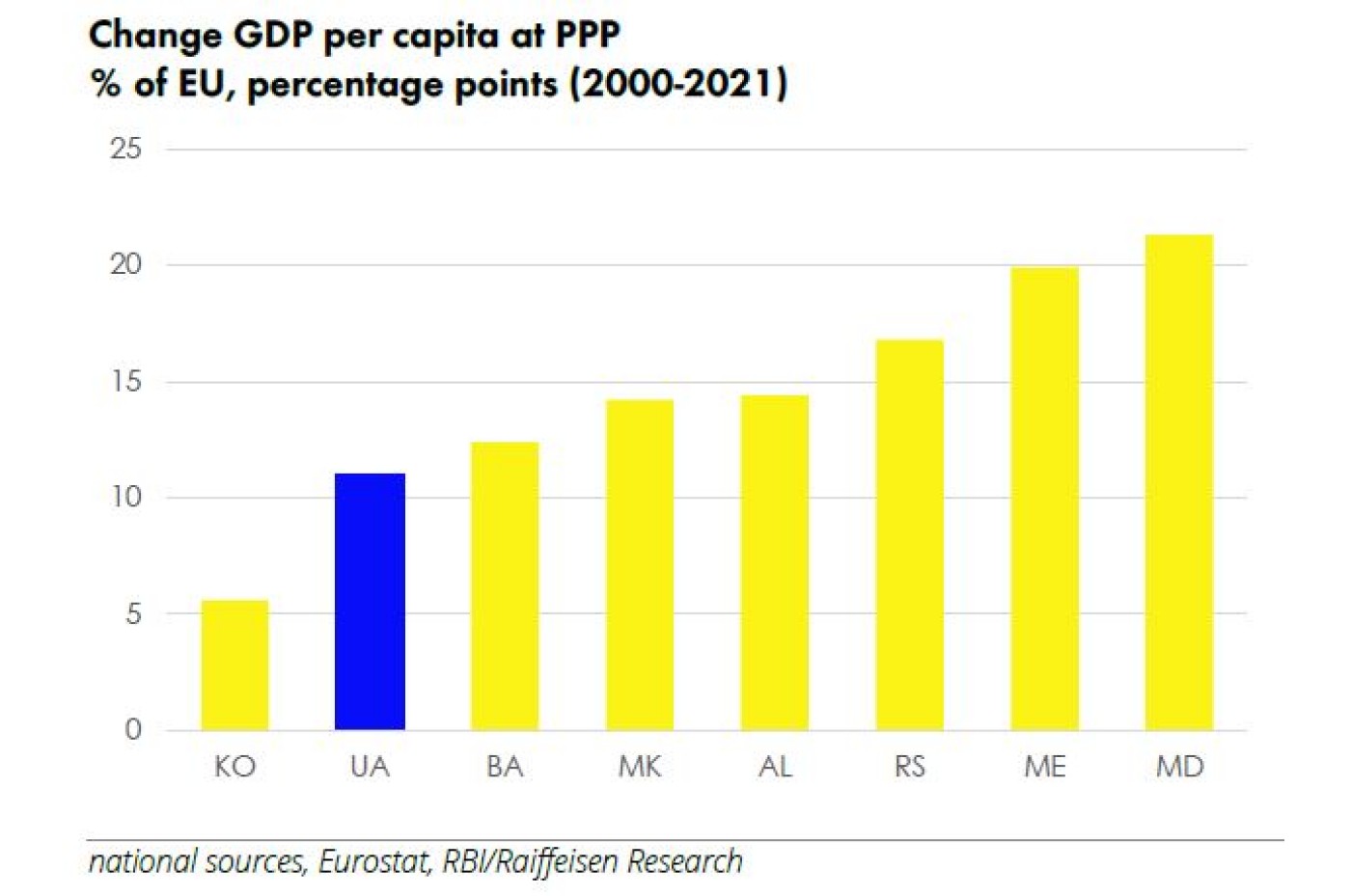
EU: A golden opportunity for Ukraine, realism on the ground
Inside Ukraine, there were no doubts that the EU will grant the country candidate status. After Russia's recent aggression, there was no other choice and no more risk, although it is clear that the Euro/EU integration willingness of the Ukrainian population became the primary cause of Russian aggression, that already started in 2014. Since that time and especially after the direct invasion of Ukraine in February, the share of Ukrainians supporting EU accession has increased to a tremendous 91% if comparing to just 68% before the war started. Hence, the decision of the EU regarding candidacy status for Ukraine has been already “priced in” inside the country. Consequently, a negative EU decision (disregardingthe further progress in the issue) would have been a substantial discouraging factor, which is non-desirable under current circumstances of clear Western/EU support against Russia's aggression. Almost everyone in Ukraine understands that the EU granted the candidacy status in advance and on a goodwill basis. In terms of formal criteria (regarding political freedom,democracy, anti-corruptions, regulatory framework, etc.) the country may not meet requirements. However, being a candidate for EU membership is viewed as a constructive challenge for Ukraine to adjust policies and regulations in accordance with EU standards. And there is some track record here. In regard to the EU-Ukraine Association Agreement (signed in 2014) Ukraine has already implemented 63% of the requirements stipulated inthe agreement. We also positively assess additional financial programs and opportunities that are available to candidates (as it can be seen on the Western Balkans), which would be especially important for Ukraine during post-war reconstruction. Moreover, a long journey towards EU membership, which may take at least ten years (or up to twenty years), provides a good opportunity for Ukraine to be well-prepared for the next step and to implement plus anchor necessary reforms. Therefore, disregarding the outcome or further EU actions, we positively assess the recent EU decision granting Ukraine candidate status. This process should help to anchor investor confidence longterm, to transform the country into an internationally well integrated and marketorientedeconomy with strong democratic institutions.
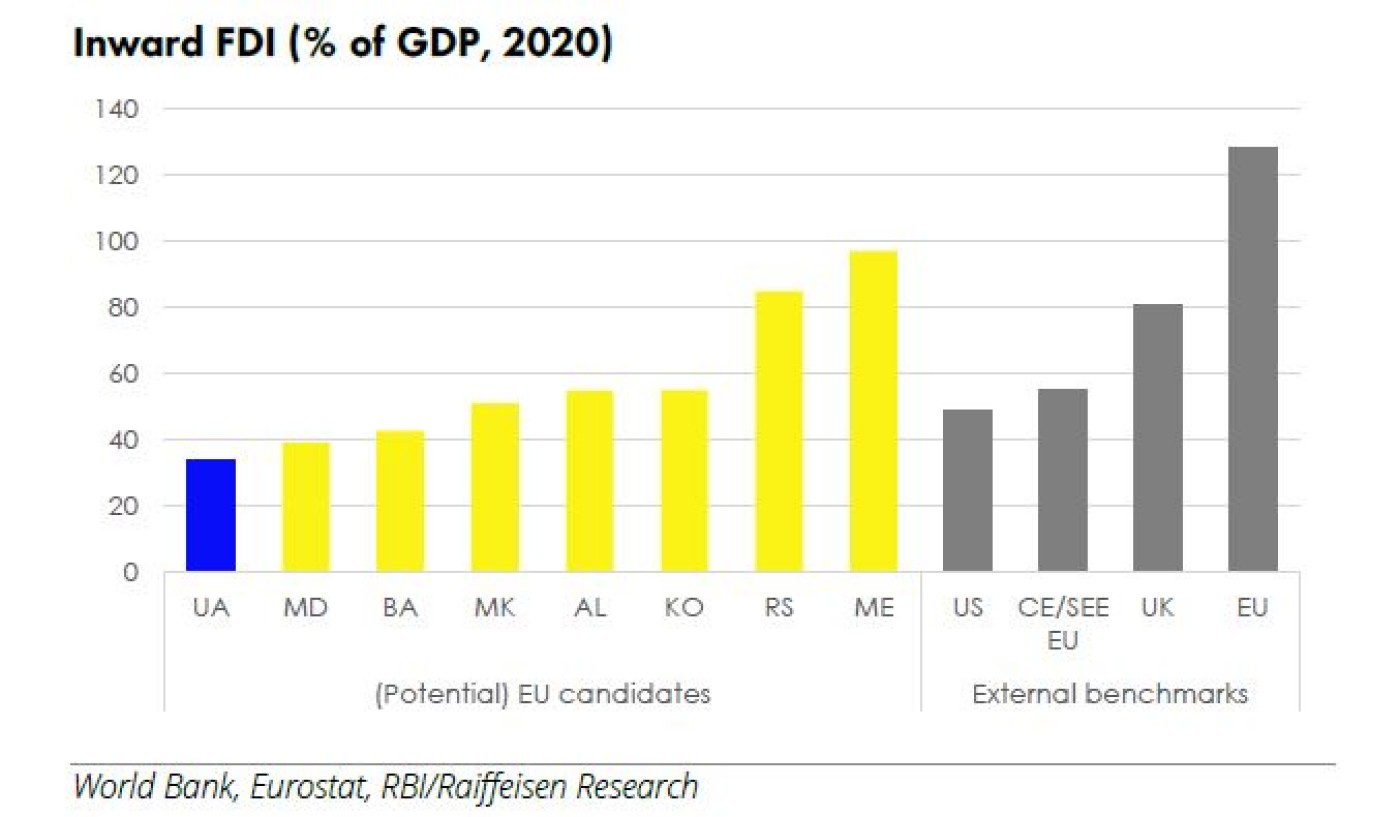
EU: No geopolitics and self-interest in the Western Balkans?
For the Western Balkans, the above has interesting implications. It becomes clear that not only the potential EU enlargement into the Post-Soviet space could be seen from a geostrategic perspective. In the Western Balkans, there is an active competition of rising interests with Russia, China and, to some extent, Turkey. Even though the geopolitical challenge or confrontation may be smaller on the Western Balkans, the EU could show geopolitical problem-solving competence here with relatively little effort or risk attached. This issue should also be accepted by countries that are traditionally more skeptical about EU enlargement. But the EU has not yet arrived at a geopolitical view of the Western Balkans. In the recent frictions in Bosnia and Herzegovina, one once again had the unfortunate impression that the USA and the UK have played the geostrategic and sanctions agendas more strongly than the EU (once again due to internal blockades within the EU). Considering geopolitical and geoeconomic considerations, sensible compromises between the candidate countries and the EU are possibly needed. Certainly, the (internal) political and economic criteria for EU accession cannot be neglected, but the mostly constructive support of almost all Western Balkan countries for the (geo)strategic positioning of the EU (also vis-à-vis Russia and Ukraine) should be appreciated.
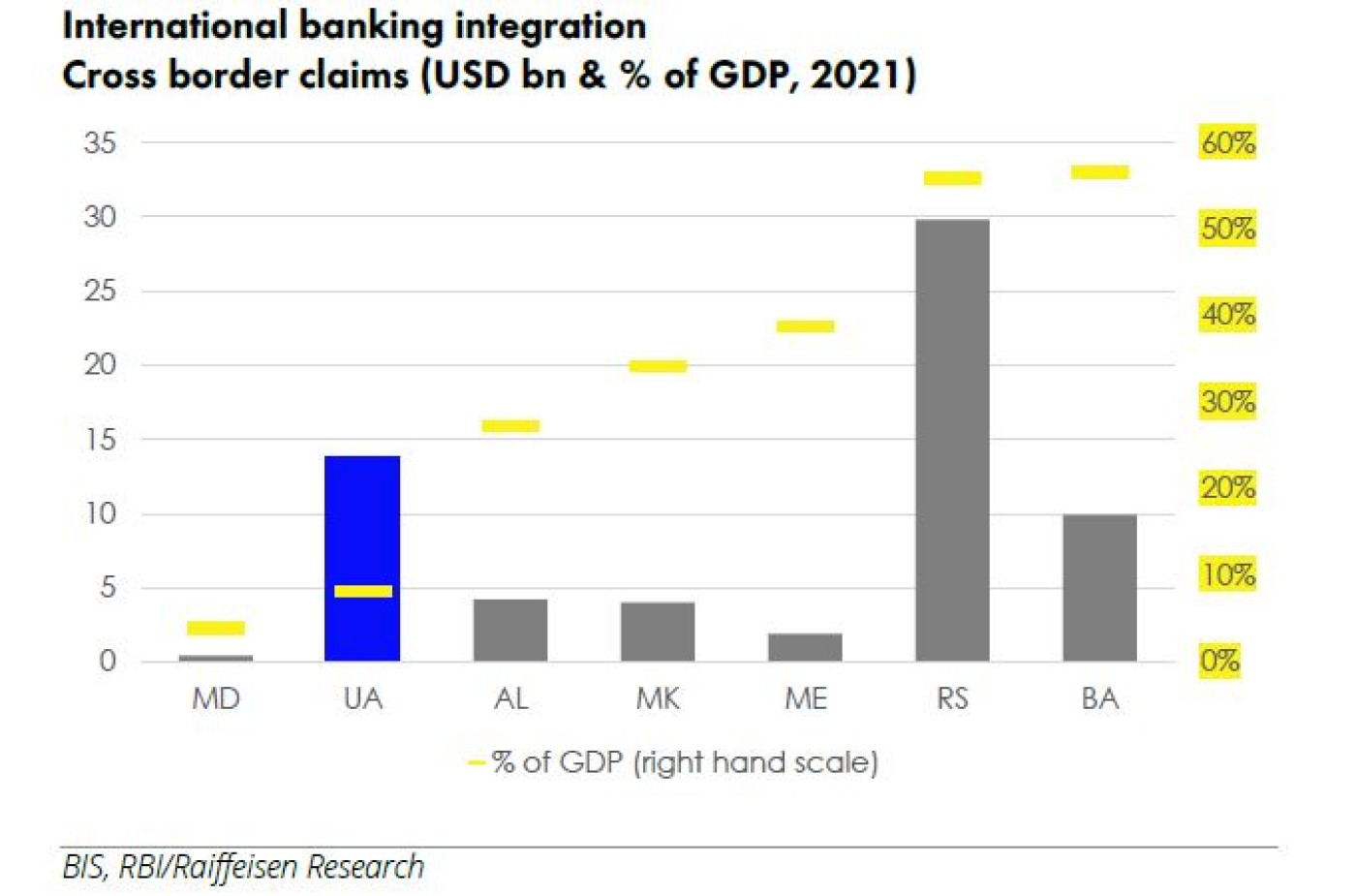
Overall, it is therefore very important that the EU gives an olive branch to Western Balkan countries, but also that these countries are kept under surveillance against any backdrop of democratic progress. The changes to the enlargement methodology with the reversibility and the perennial opening until full accession of the Chapters 23 “Judiciaryand Fundamental Rights” goes in the right direction. The enlargement process should not be considered purely a bureaucratic process with boxes to be ticked. To avoid the errors of the past and not further alienate Western countries against the uncompleted democracies of the "East" much more attention on political reforms could be exerted during the negotiation phase.
The EU could show geopolitical responsibility with a rather rapid (partial) integration of the Western Balkans. After all, a clear accession process for Bosnia and Herzegovina or Kosovo (on top of Albania and North Macedonia) would also be about pacifying internal and regional conflicts that have geopolitical connections (also to Russia). Furthermore, it would be possible to create a certain "benchmarking" and competitive situation within a broader accession negotiation competition between more states. In this way, it might also be possible to initiate "accession rounds" again, although of course every accession decision is also a case-by-case decision. For example, it would be possibly feasible to achieve a faster round of enlargement in the 2020s with more advanced negotiation countries, while Balkan countries that may still be somewhat undecided in geopolitical terms (e.g. Serbia) would possibly have to accept a later accession.
Additionally, the (potential) enlargement to include the Western Balkans and Ukraine should also be seen as partly connected in terms of time and content. On the one hand, the same transformation and reform efforts as in the Western Balkans must be demanded of the new accession candidates Ukraine and Moldova. In this respect, certain integration successes of the long waiting EU candidates of the Western Balkans are also important for new EU candidates. On the other hand, accession processes as slow as those in the Western Balkans must be avoided. There is already great frustration here. Similar frustration or even partial alienation must be avoided in Ukraine (in the longterm). It should be noted that Russia will probably actively exploit any weaknesses in the EU enlargement process (with regard to the Western Balkans and/or new candidates) propagandistically in the future in order to showcase a presumed "weakness" of EU. Incidentally, the same can be expected if individual EU countries will actively block the opening of official accession talks of Ukraine (or other candidates) at some point in the future. In this respect, the EU must also learn sensible power politics internally (be it visà-vis Bulgaria and/or Hungary) and, as shown below, strengthen its own capacity to act.
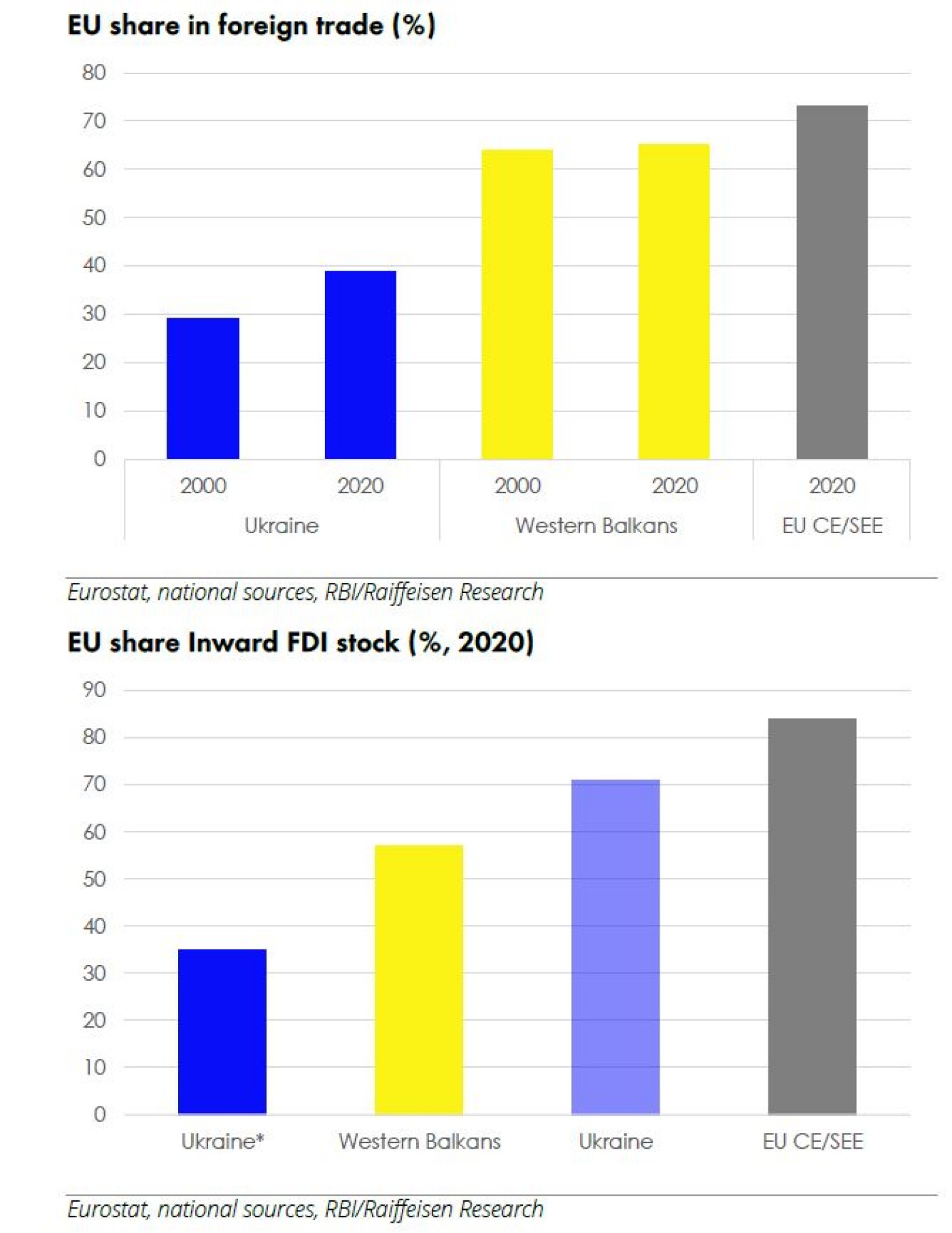
Ukraine/Western Balkans: Accession dimensions and supplementary policy fields
The (potential) enlargement to the Western Balkans is already seen as a substantial challenge at the EU level. This is especially true at the political level and in terms of voting procedures; it is less so in terms of population and economic power. In this respect, we believe it makes sense to actively link EU enlargement to the Western Balkans with the internal reform of EU voting mechanisms. In this way, the EU would put itself under meaningful pressure and not "only" the enlargement candidates. It would therefore be expedient to agree on both, an EU reform and enlargement target date or time corridor (e.g. 2027-2030). We think that such a long-term ambition fits well with the comprehensive mission- and vision-oriented EU policy orientation in other areas (such as green transformation). In this respect, it is clear that only when the Western Balkans (or parts of) are integrated into the EU and the EU will manage to reform its internal coordination mechanisms and demonstrates more geopolitical problem-solving competence (plus corresponding pragmatism) can the EU really turn its attention to the accession candidate Ukraine or other (potential) accession candidates.
This holds especially true as the (potential) EU enlargement to include Ukraine will havea completely different political, EU-institutional and economic dimension. Ukraine's EUaccession will certainly have substantial effects on EU voting procedures (including blocking minorities in majority procedures) or the EU budget given the size of the population and the (long-term) economic potential of Ukraine. Not to forget about its agricultural sector. As a possible EU member, Ukraine will certainly also seek further close cooperation with the US and the UK and will certainly coordinate closely with Poland and partly with the Baltic States. At the same time, Ukraine as a possible EU memberwill significantly strengthen the "Eastern" dimension of the EU in the long term and will probably also contribute a cautious to defensive stance (together with Poland and the Baltic States) towards Russia. In contrast, we do not see any active geopolitical agendas of its own or very hot ones floating into the EU with regard to the Western Balkans.
In this context, it should also not be underestimated that from the Russian official side EU entries have formally been viewed less with some skepticism, as the EU is not viewed a "military organisation" (yet). However, this could change by the time of a possible accession window for Ukraine (and or other candidates). It should not be forgotten that Russia has in the past actively countered more concrete EU advances by some countries.
As mentioned earlier the EU enlargement process shall possibly go hand in hand with governance reforms of the EU. The veto might have worked in the past with fewer member states, but as the case of enlargement in the Western Balkans has shown it has become an obstacle for the EU in pursuing its agenda in geopolitical terms and risks alienating the countries that eagerly look to the EU and create black holes in the region. Although it will be difficult to reform the EU in the short term, this should not hamper the progress with opening of the negotiations with Western Balkan countries. The enlargement process has shown for other CE/SEE countries that the largest progress made has been during the negotiation phase, with institutional reforms and modernization of the countries bringing tangible (economic) benefits to the population. As an illustration, the distance for GDP per capita levels (at purchasing power parities) between the Western Balkans and EU countries from CE/SEE has increased from 25% to 37% since 2000 ... although less developed or relatively poor countries should "normally" show higher economic and convergence growth.
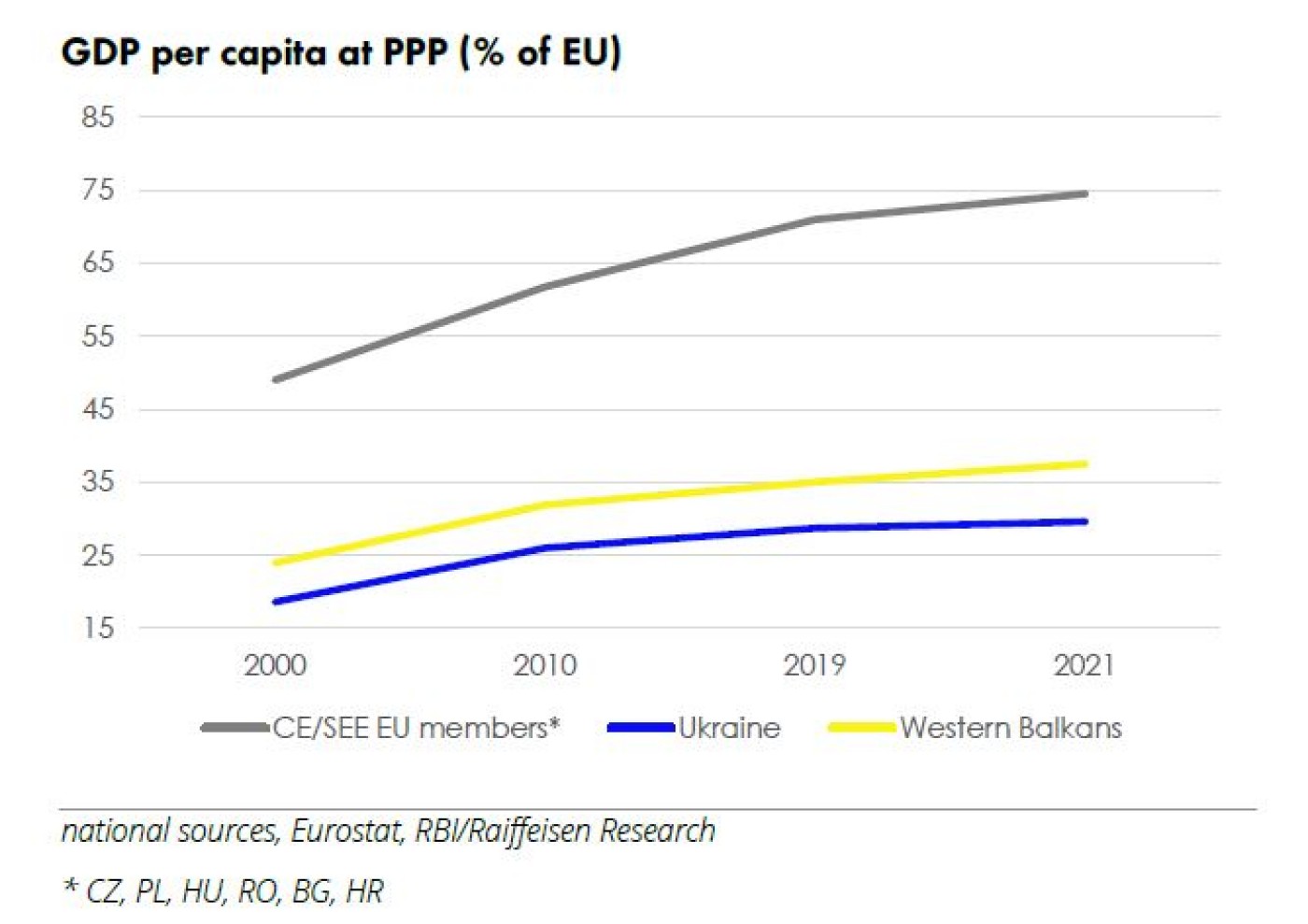
What can be done ahead of the EU enlargement - Austrian or French way?
However, even if the process of giving the candidate status to all Western Balkan countries is completed it will not be enough. To rely only on a possible reform of the EU and an accompanying possibility of enlargement to include (some) Western Balkans countries at the end of the 2020s (the earliest) would be too little and would probably be too risky. It is probably about progress made before then. After many years of fast economic growth, some Western Balkan countries' convergence towards the EU has stalled. Even more astonishing is the contrast with other CE/SEE countries that are now EU members. This demonstrates how important EU integration has been in economic terms and what a powerful driving force the economic integration could be.
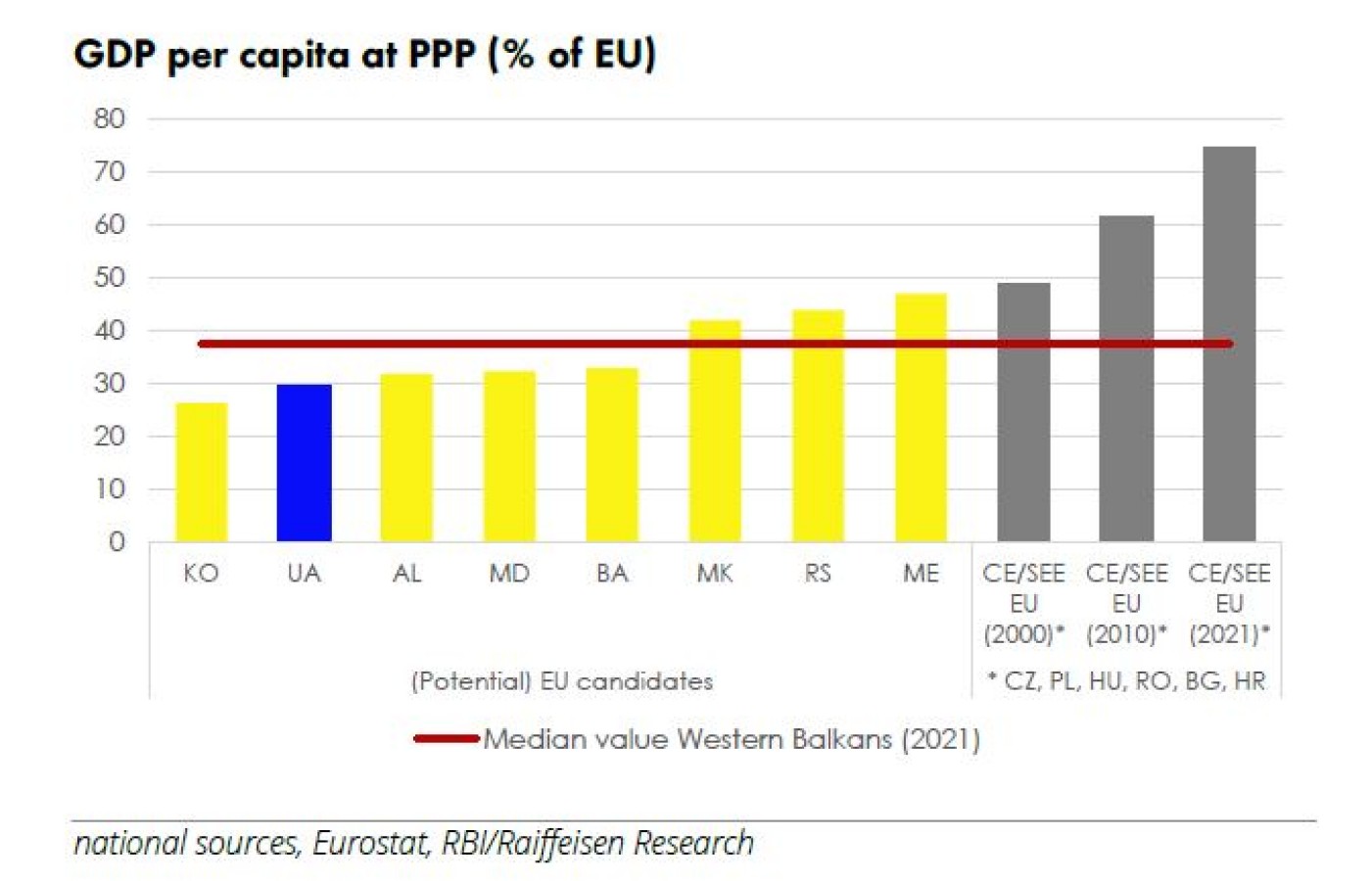
It’s therefore of paramount importance in our opinion to deliver an overhaul of the EU funding for negotiating countries, i.e. to provide substantive EU funding and cooperation with EU institutions here ahead of final EU membership. An Austrian policy proposal (having the backing of some other member states) that goes in this direction is very important, with the EU investment plan for the Western Balkans being a welcomed initial step. If countries make progress by closing chapters of the EU accession negotiation it would be very important that they are somehow integrated in the EU (financing) programs that concern those chapters. This would have tangible impact on the population of the Western Balkan countries as well as in the preparation of these countries to be ready when they become full members. Participation in EU meetings with a special status without voting rights, involvement in the preparation of policies could speed up the process of convergence and render these countries more ready when full membership comes.
However, different proposals have been put forward in the last weeks. The French proposals regarding a "European political community" or "Wider Europe" that should include EU members, those aspiring to become members and other (European) countries remain murky as details are lacking. The fear in the Western Balkans is that this will become a permanent waiting room for these countries without possibility to become members one day. If this were to be the case, it might have detrimental effect on the Western Balkan countries as the hope of being one day full members with rights and duties would be quashed. That would probably cause another wave of people leaving towards EU countries with instability issues emerging again and another hit to the possibility of these countries converging towards EU standards. Will EU be able to reconcile its much-needed internal reforms and at the same time be able to integrate the Western Balkan countries? Time will tell.